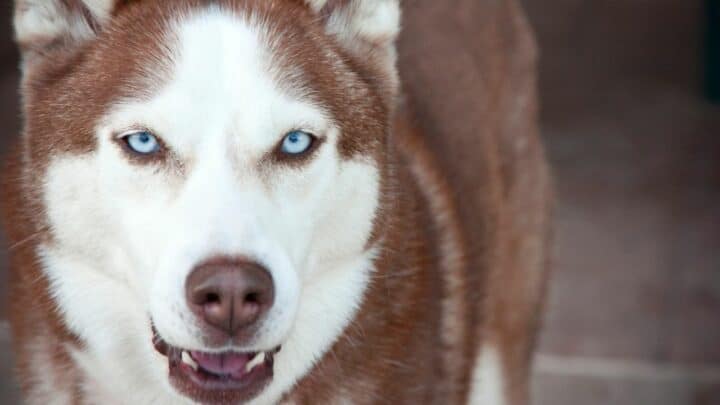Huskies are affectionate and outgoing dogs classified as medium to big-sized dogs. They’re like human babies that tend to increase in height first and then grow plumper.
If you’re planning to raise a husky, you’ll seemingly relish watching them grow distinctively.
Just like humans, they also undergo different developmental stages. However, it takes a longer time for Siberian Huskies to mature and develop compared to other canine breeds.
How fast do Huskies grow?
Huskies grow notably fast within the first 24 weeks of their life. However, they slow down in physical growth after that period. Normally, their growth rate increases again around 12-18 months, but in a much more gradual phase.
Standard Husky size
The American Kennel Club suggests that the male huskies reach 21-23.5 inches (53-60cm) and weigh 45-60 pounds (20-27kg). For females, they need to be at least be 20-22 inches (51-56cm) and 35-50 pounds (16-23kg) in weight.
Most husky dogs will fall within these scales, but they can always differ in their height and weight depending on some factors.
Genes that determine their size are unpredictable. Sometimes, two mid-sized huskies can produce a short or an oddly tall puppy.
How big a Husky gets after its first year of life
At the age of 1, your husky has then stretched to its ultimate height and will barely gain weight in the next months.
Your husky might reach 20-24 inches high (51-61cm) and will weigh around 35 and 55 pounds (16-23kg) after a year.
Factors limiting a Husky’s growth
Huskies are considered hyperactive canines. When you don’t limit their space, they prefer to move around, run, and exercise a lot that causes them to burn a lot of calories.
Also, if they’re not spayed or neutered yet, their metabolism is indeed fast.
But, no need to fret. As long as your Husky has a healthy coat, he is doing just fine. They’ll gain significant weight after the age of 3.
When Huskies get their final coat
A Husky originally has a puppy coat that makes them look like a pluff ball! And as they grow, their coat varies.
At around 10 months, your dog will change its puppy fur to its final adult coat. This process is achieved when he turns 12-14 months old.
Note that your dog will need a lot of brushing to maintain its thick coat. You may have to let him get used to grooming as they shed a lot.
Husky eye color changes
Newborn Huskies are always born with blue eyes. However, they turn to another color which becomes permanent then.
You may witness your dog change its eye color after 8 weeks or maybe as late as 6 months.
When do Huskies mature mentally: Truth revealed
Huskies usually mature around 2 years of age. When it comes to their mental development, they’re like humans as it occurs at alternating points.
This type of canine is a lot impressive since they are easily trainable.
Before your Husky turns 2, it is likely helpful to establish a worthwhile training and pleasing behavior to instill obedience early on.
This will also make him calmer and well-behaved.
Frequently Asked Questions about How fast do Huskies grow
How can obesity affect Husky’s development?
Most commonly, obesity can be a vital health issue in Huskies. It is considered a severe illness that might lead to the worsening of their joint and heart problems, spine, and metabolic functions. Instead of overfeeding or spoiling your husky with food, you might consider hugging him or divert his attention. Too much weight is always not good for their healthy growth, especially for the first two years.
How do I take care of my Husky at home for better growth?
The most desirable way for you to keep your Husky healthy is to keep an eye on her diet, encourage exercise, clean coat and teeth regularly, and visit the pet doctor for a check-up constantly. At the same time, follow the schedule of vaccinations recommended for your husky. This is to prevent the common diseases that hit Huskies.
When should my Husky see the vet?
From the moment you see anything unusual in your Husky, go to the pet hospital right away for immediate medication. It might be considered a little problem, however, some canine complications might include complex symptoms and worsen anytime.
How can parasites affect my Husky?
Several types of parasites like worms and bugs can exist inside your Husky’s body. These can seriously infect their skin and ears and cause dangerous pain, too much distress, and even death. Parasites like hookworms and heartworms can enter their system by drinking contaminated water, being bitten by an infected mosquito, and walking on contaminated soil. With this, preventive medication is always necessary since it can protect healthy development and save the life of your pet husky.
Conclusion
In general, Siberian Huskies are a company-loving and sociable dog breed that are open to meeting people.
They can be effortlessly trainable, however, their owners can expect sudden tantrums from them while they’re still unable to regulate themselves before 2.
Their size or the speed of their growth might not always determine their overall health. That is why owners need to observe whether their dog is regularly active or having a healthy-looking coat.


